
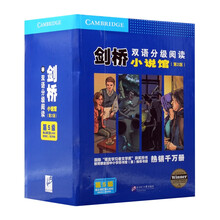
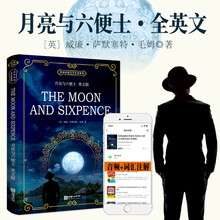

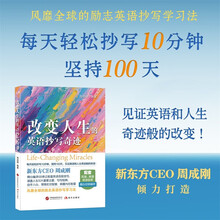

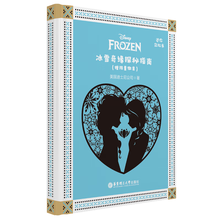


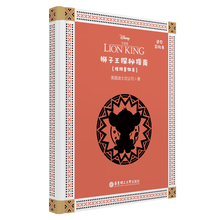
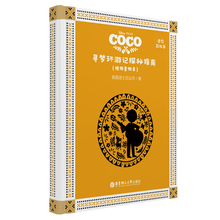
从1895 年美国《书商》杂志开启“按销量排序的图书目录”,美国的“畅销书”至今已有百年发展史,其间荣登年度榜的图书达上千册。
不过登上畅销书排行榜的并不总经得起时间的冲刷,许多名噪一时的畅销书早已销声匿迹,尘封在历史的沟壑中。
本系列所选的畅销书都历经淘洗,至今光彩斐然,甚具代表性。成功类的书籍诸如《白手起家的商人给儿子的信》、《罗斯福总统给子女的信》和《如何度过一天的24 小时》;文学类的书籍众多,包括赫赫有名的《马克·吐温自传》,开创了美国西部牛仔小说先河的《弗吉尼亚人》,反映纽约上层社会生活的《纯真年代》,表现女性自我探索的《满溢之杯》,讲述一战之后生死与重建的《贫穷的聪明人》,扣人心弦、探求正义的《公平与不公平》,文字优美、充满真挚情感的爱情小说《百分之一的机会》和表现纽约曼哈顿贫民区生活的《明确的目标:纽约爱情故事》等;此外还有文化类书籍——世界史研究界几乎无人不知的H. G. 威尔斯的《历史的概要(世界史纲)》。每本读来都会有不一样的收获,可以满足读者对不同类型书籍的偏好。
阅读美国百年畅销图书,浸润美国最地道的语言,了解美国原汁原味的文化。
玛利亚·蒙台梭利(Maric Montcssori,1870-1952),是教育史上一位杰出的幼儿教育思想家和改革家,她所创立的独特的幼儿教育法,风靡了整个西方世界,深刻地影响着世界各国,特别是欧美先进国家的教育水平和社会发展。蒙台梭利教育法的特点在于十分重视儿童的早期教育,她的教学方法涵盖智力训练、感觉训练、运动训练各个方面、蒙台梭利教育法在中国已经有广泛传播,尤其是蒙台梭利幼儿园在幼儿教育中是一支重要力量。《世界名著典藏系列:蒙台梭利教育法(英文全本)》是蒙台梭利论述幼儿教育理论和方法的第一部著作,对于读者了解蒙台梭利教育是一个很好的引导。
It behooves us to think of what may happen to the spirit of the child who is condemned to grow in conditions so artificial that his very bones may become deformed。 When we speak of the redemption of the workingman, it is always understood that beneath the most apparent form of suffering, such as poverty of the blood, or ruptures, there exists that other wound from which the soul of the man who is subjected to any form of slavery must suffer。 It is at this deeper wrong that we aim when we say that the workman must be redeemed through liberty。 We know only too well that when a man‘s very blood has been consumed or his intestines wasted away through his work, his soul must have lain oppressed in darkness, rendered insensible, or, it may be, killed within him。 The moral degradation of the slave is, above all things, the weight that opposes the progress of humanity - humanity striving to rise and held back by this great burden。 The cry of redemption speaks far more clearly for the souls of men than for their bodies。 What shall we say then, when the question before us is that of educating children?
We know only too well the sorry spectacle of the teacher who, in the ordinary schoolroom, must pour certain cut and dried facts into the heads of the scholars。 In order to succeed in this barren task, she finds it necessary to discipline her pupils into immobility and to force their attention。 Prizes and punishments are every-ready and efficient aids to the master who must force into a given attitude of mind and body those who are condemned to be his listeners。 It is true that to-day it is deemed expedient to abolish official whippings and habitual blows, just as the awarding of prizes has become less ceremonious。 These partial reforms are another prop approved of byscience, and offered to the support of the decadent school。 Such prizesand punishments are, ifl may be allowed the expression, the bench of thesoul, the instrument of slavery for the spirit。 Here, however, these are notapplied to lessen deformities, but to provoke them。 The prize and thepunishment are incentives toward unnatural or forced effort, and,therefore we certainly cannot speak of the natural development of thechild in connection with them。 The jockey offers a piece of sugar to hishorse before jumping into the saddle, the coachman beats his horse thathe may respond to the signs given by the reins; and, yet, neither of theseruns so superbly as the free horse ofthe plains。
And here, in the case of education, shall man place the yoke upon man?
True, we say that social man is natural man yoked to society。 But if wegive a comprehensive glance to the moral progress of society, we shallsee that little by little, the yoke is being made easier, in other words, weshall see that nature, or life, moves gradually toward triumph。 The yokeof the slave yields to that of the servant, and the yoke of the servant to that of the workman。
……
CHAPTER 1
CHAPTER 2
CHAPTER 3
CHAPTER 4
CHAPTER 5
CHAPTER 6
CHAPTER 7
CHAPTER 8
CHAPTER 9
CHAPTER 10
CHAPTER 11
CHAPTER 12
CHAPTER 13
CHAPTER 14
CHAPTER 15
CHAPTER 16
CHAPTER 17
CHAPTER 18
CHAPTER 19
CHAPTER 20
CHAPTER 21
CHAPTER 22